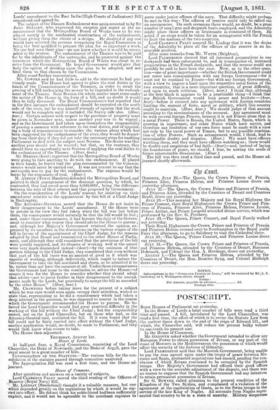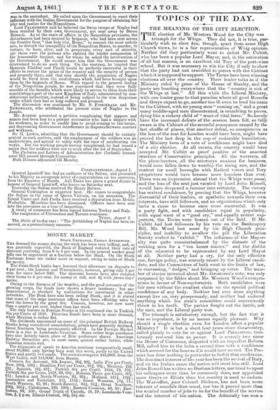POSTSCRIPT.
BOTH Houses of Parliament sat yesterday, In the House of Lords a large number of bills were read a third time and passed. A bill, introduced by the Lord Chancellor, was read a first time, the effect of which is to revise the Statute Law from the earliest times down to the end of the reign of Edward III., and which, the Chancellor said, will reduce the present bulky volume to one-tenth its present size. In the House of Commons, Mr. GRIFFITH asked whether the Government intended to allow any European Power to obtain possession of Zetuan, or any part of the coast of Morocco in the Mediterranean the possession of which would affect the security of the fortress of Gibraltar.
Lord PALMERSTON said that the Moorish Government, being unable to pay the sum agreed upon under the treaty of peace between Mo- rocco and Spain, protracted negotiations had ensued, pending the con- clusion of which Zetuan continued to be occupied by the Spanish troops. Her Majesty's Government had offered their good offices with a view to the amicable adjustment of the dispute, and there was no reason to suppose that the Spanish Government had any intention to retain permanent possession of Zetuan. Sir G. BOWYER called attention to the present condition of the Kingdom of the Two Sicilies, and complained of a violation of the agreement at the capitulation of Gaeta, as to the Swiss troops in the service of the late King of Naples. All accounts from Naples repre- sented that country to be in a state of anarchy. Military despotism
was in the ascendant. He called upon the Government to exert their influence with the Italian Government for the purpose of obtaining fair play and justice for the Neapolitans.
Lord PearsasToN said he believed the Swiss troops at Naples had been recalled by their own Government, not sent away by Baron Bicasoli. As to the state of affairs in the Neapolitan provinces, the disturbances had been created by brigands, who had been sent across the frontier from "that holy city, Rome," to commit the most unholy acts, to disturb the tranquillity of the Neapolitan States, to murder, to torture, to burn alive, and to perpetrate every sort of atrocity, yet these were the persons who excited the tender compassion of the honourable baronet, and for whom he asked the intervention of the Government. He could assure him that the Government was determined to do no such thing. On the contrary, he trusted that Generals Cialdini and Pinch i would be perfectly successful in their efforts to restore the peace of the country and the security of person and property there, and that very shortly the population of Naples would be freed from the misfortunes which had been brought upon them by the brigands of Rome. With regard to the general feeling of the Neapolitan people, he was convinced that they were fully sensible of the benefits which were likely to accrue to them from their constituting a part of the new Kingdom of Italy, administered by con- stitutional authorities, instead of hem subject subject to the iron despotism under which they had so long suffered'" and groaned. The discussion was continued by Mr. S. FITZGERALD and Mr. NEWDEGATE, who attributed the present state of Naples to the Jesuits.
Mr. AYRTON presented a petition complaining that sappers and miners had been lent to a private contractor who had a dispute with his workmen, in order to enable him to avoid coming to fair terms, and deprecating Government interference in disputes between masters and workmen.
Sir G. LEWIS, admitting, that the Government should be entirely neutral in such matters, said the employment of the soldiers wasan inadvertence, and agreed to solely with the view of accelerating the works. But the working people having complained, he had issued a notice that the soldiers were not to work after the 1st of September.
The Probates and Letters of Administration Act (Ireland) Amend- ment Bill passed through Committee. Both Houses adjourned till Monday.































 Previous page
Previous page